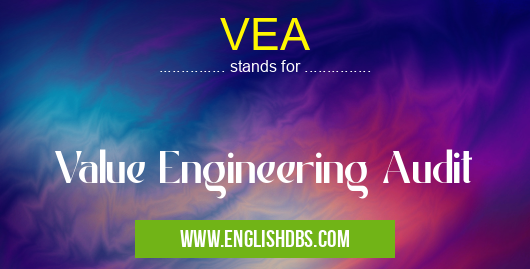What does VEA mean in ENGINEERING
Value Engineering Audit (VEA) is a systematic review of a product, project, or process to identify areas where cost can be reduced without compromising function or performance. VEA is often used in engineering and manufacturing to improve efficiency and value for money.

VEA meaning in Engineering in Academic & Science
VEA mostly used in an acronym Engineering in Category Academic & Science that means Value Engineering Audit
Shorthand: VEA,
Full Form: Value Engineering Audit
For more information of "Value Engineering Audit", see the section below.
What is VEA?
VEA is a disciplined process that involves analyzing a product, project, or process in detail to identify potential areas for cost reduction. The VEA team typically consists of engineers, designers, and other experts who have experience in the relevant field.
How does VEA Work?
The VEA process typically involves the following steps:
- Identify the problem: The first step is to identify the problem that needs to be solved. This may be a specific cost problem, or it may be a more general problem with the product, project, or process.
- Gather data: The next step is to gather data about the problem. This may include data about the product, project, or process itself, as well as data about the costs associated with it.
- Analyze the data: The data is then analyzed to identify potential areas for cost reduction. This may involve identifying areas where the product, project, or process can be simplified, or where alternative materials or methods can be used.
- Develop solutions: Once potential areas for cost reduction have been identified, the VEA team develops solutions to address these areas. These solutions may include redesigning the product, project, or process, or changing the way it is manufactured or operated.
- Implement solutions: The final step is to implement the solutions. This may involve making changes to the product, project, or process, or it may involve changing the way it is operated or maintained.
Benefits of VEA
VEA can provide a number of benefits, including:
- Cost reduction: VEA can help to identify areas where costs can be reduced without compromising function or performance.
- Improved efficiency: VEA can help to improve efficiency by identifying areas where the product, project, or process can be simplified or streamlined.
- Increased value for money: VEA can help to increase value for money by identifying areas where the product, project, or process can be improved without increasing the cost.
Essential Questions and Answers on Value Engineering Audit in "SCIENCE»ENGINEERING"
What is a Value Engineering Audit (VEA)?
A VEA is a systematic and objective review of a project or product to identify and eliminate unnecessary costs while maintaining or improving its quality and functionality.
What are the benefits of conducting a VEA?
Benefits include reducing project costs, optimizing resource allocation, improving product quality, enhancing functionality, and reducing waste.
Who typically conducts VEAs?
VEAs are typically conducted by a multidisciplinary team of engineers, architects, contractors, and other specialists.
What are the key steps involved in a VEA?
The key steps include project preparation, information gathering, function analysis, creative generation, solution evaluation, and implementation planning.
What is the difference between a VEA and a Value Engineering Study (VES)?
A VEA is a more comprehensive review than a VES, and it typically involves a broader team and a longer timeframe. A VES focuses on a specific part of a project or product, while a VEA examines the entire project or product.
What industries commonly use VEAs?
VEAs are used in various industries, including construction, manufacturing, aerospace, and healthcare.
How do you ensure the objectivity and credibility of a VEA?
To ensure objectivity, VEAs should be conducted by independent teams that are not directly involved in the design or implementation of the project. Credibility can be established by following recognized standards and best practices.
What are the common challenges associated with VEAs?
Challenges include resistance to change, limited resources, and the need for a highly skilled team.
Final Words: VEA is a valuable tool that can help to identify areas where costs can be reduced without compromising function or performance. VEA can be used to improve efficiency and value for money in a wide variety of industries.
